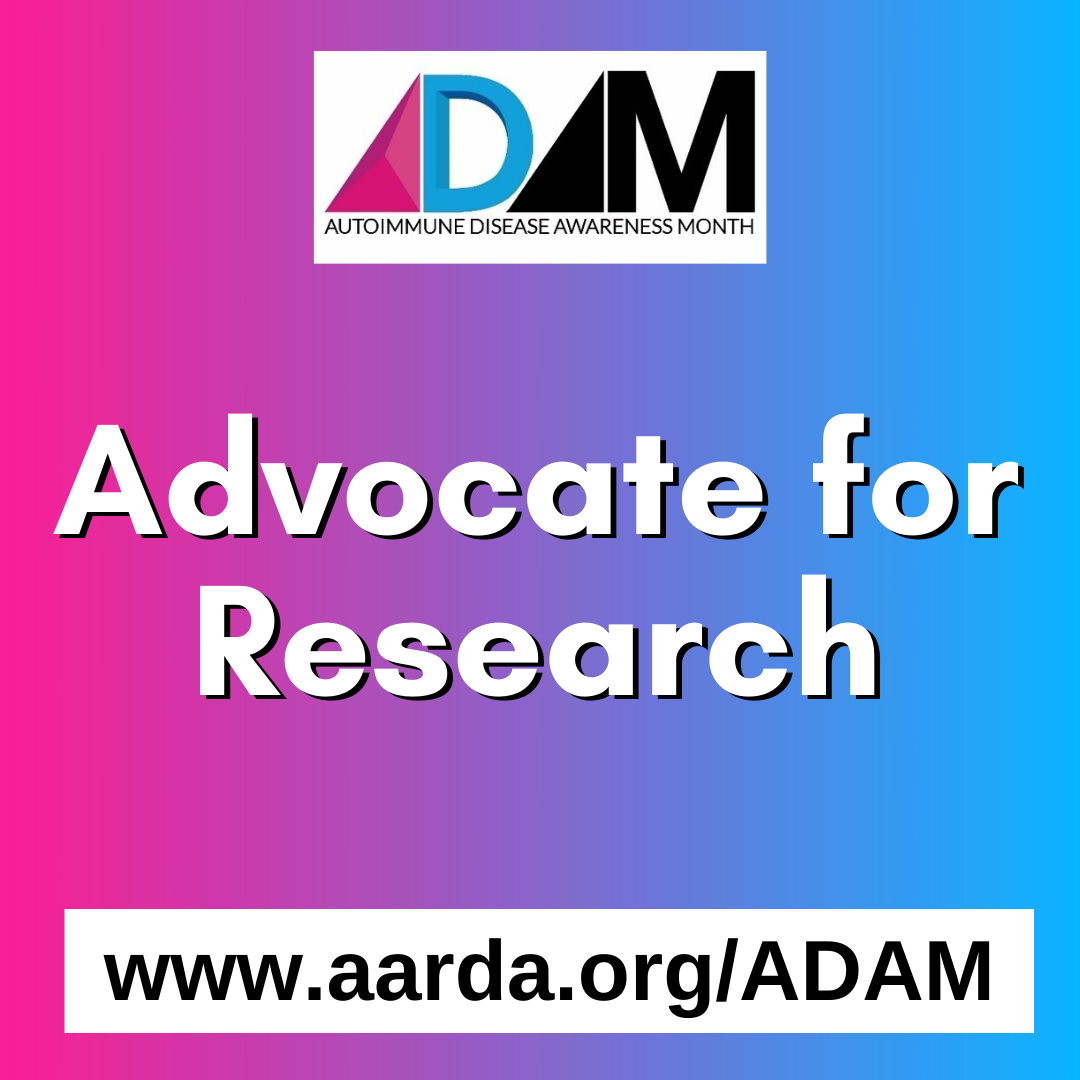
Be an Advocate for Autoimmune Disease Research
Among the challenges facing the autoimmune disease community, is the lack of funding to research this category of disease.
Autoimmune disease is difficult to diagnose, many are classified as rare conditions, they are often misunderstood by both the medical community and the public. All these factors make research and understanding of autoimmune disease so critical.
The silver lining is that research and exploration of these diseases lead to advancements in other autoimmune diseases. The ripple effect can reach unknown shores of breakthroughs and treatment options for people living with these diseases.
AARDA’s Virginia T. Ladd Young Investigators Program seeks to foster research into basic autoimmunity issues. Basic refers to the whole autoimmune picture, that is, research that could benefit the entire autoimmune community as opposed to single or disease-specific groups.
Everyone has the power to make change happen. Advocate for more autoimmune disease research funding and contribute to Autoimmune Association to help us continue our Virginia T. Ladd Young Investigators Program and other research initiatives to benefit the future of the autoimmune disease community.
[button title=”Make a Donation” link=”https://secure.acceptiva.com/?cst=CuvJ4J” target=”_blank” align=”” icon=”” icon_position=”” color=”blue” font_color=”white” size=”2″ full_width=”” class=”” download=”” rel=”” onclick=””]
Meet the Recipients:
Beth Wallace, University of Michigan, “Glucocorticoid Prescribing within a Cohort of Veterans with Rheumatoid Arthritis”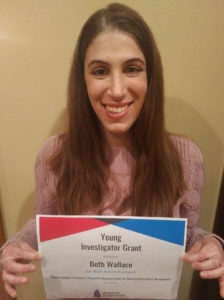
“I am a rheumatologist and early career investigator at the University of Michigan. My career goal is to optimize the treatment of autoimmune diseases by designing personalizable medication regimens that keep symptoms under control while reducing side effects. My current work focuses on better understanding how doctors are using oral steroids, like prednisone, to treat rheumatoid arthritis (RA), which is the most common type of autoimmune arthritis. Over three-quarters of RA patients use steroids, even though they are known to cause serious side effects like heart attacks, infections, and bone fractures. Treatment guidelines for RA recommend that steroids be tapered off, but cannot provide clinicians with data-based instructions on how to taper. Because tapering can lead to RA flares or steroid withdrawal symptoms, clinicians often avoid tapering steroids in RA patients who have been on them long-term. As a result, a quarter of RA patients on long-term steroids remain on them even when their RA is in remission.
This Young Investigator Grant will allow me to (1) develop an evidence-based definition of steroid tapering, informed by real-world practice, and (2) identify the patient characteristics most associated with successful steroid tapering in RA. This work will provide me with the information I need to design and test personalizable steroid tapering regimens, first for RA patients and later for patients with other autoimmune conditions.”
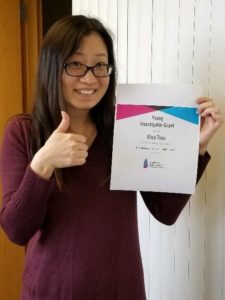 Eliza Tsou, University of Michigan, “BET Bromodomain Proteins in Scleroderma Fibrosis”
Eliza Tsou, University of Michigan, “BET Bromodomain Proteins in Scleroderma Fibrosis”
“I am grateful for the support from the AARDA. The funding allowed me to explore a new area of research-to examine the role of histone readers in scleroderma fibrosis. It has also given me the resources to generate a lot of preliminary data for future NIH grant applications. As a young investigator trying to establish my niche and presence in the autoimmunity community, funding from Foundations including the Autoimmune Association is critical at this stage of my career. Thank you! I am confident by working together we can find a cure for scleroderma soon.”
Tarun Sharma, 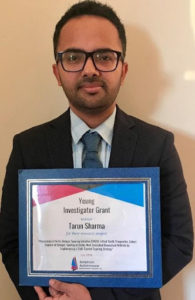 Alleghany Health Network, “Rheumatoid Arthritis Biologic Tapering Initiative (RABTI): A Real World, Prospective, Cohort Analysis of Biologic Tapering in Stable, Well-Controlled Rheumatoid Arthritis by Implementing a Multi-Faceted Tapering Strategy”
Alleghany Health Network, “Rheumatoid Arthritis Biologic Tapering Initiative (RABTI): A Real World, Prospective, Cohort Analysis of Biologic Tapering in Stable, Well-Controlled Rheumatoid Arthritis by Implementing a Multi-Faceted Tapering Strategy”
“In this study at the AHN Autoimmunity Institute, investigators are analyzing success of a biologic tapering strategy and hoping to identify predictors of and impact of successful tapering in stable, well controlled rheumatoid arthritis (RA). Established RA patients in stable remission on biologics are being identified for a dose or dosing frequency reduction where appropriate. In addition to studying successful tapering, investigators plan to measure events of infection and malignancy as part of the study as well. To follow patients longitudinally and collect and analyze data involves significant resources and time (eg. database creation, maintenance, data entry, validation, statistical analyses). The Autoimmune Association grant award will help support this longitudinal study and help answer the vital question “What are the outcomes of biologic tapering in stable RA and what can we learn from this multi-faceted biologic tapering strategy?”. This funding means a lot not only to the study team but also to all RA patients who are trying to answer this question concerning their long-term RA care.”
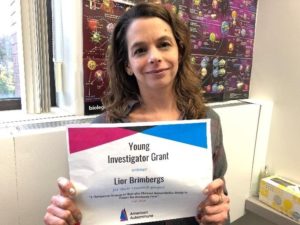 Lior Brimbergs, Northwell – The Feinstein Institute for Medical Research, “A Therapeutic Strategy to Neutralize Maternal Autoantibodies Aiming To Protect The Developing Fetus”
Lior Brimbergs, Northwell – The Feinstein Institute for Medical Research, “A Therapeutic Strategy to Neutralize Maternal Autoantibodies Aiming To Protect The Developing Fetus”
“Being a young investigator, it is my goal to accelerate my research program, publications and external funding. This award allows me to have a research assistant to support the proposed studies, and to release founding for a post-doctoral student to advance the research portfolio”.
Stephany Tzeng, Johns Hopkins University, “Biomimetic Biodegradable Particles to Expand Protective Regulatory T Cells And Prevent Autoimmune Diseases”
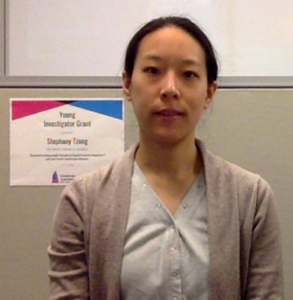
*Please note, the “Virginia T. Ladd Young Investigators Program” was previously named the “Young Investigator Grant”
Join our email list
Receive the latest blog articles, news, and more right to your inbox!
Related articles you might be interested in

Finding Purpose on the Trail: A Father’s Journey Through the Shenandoah for His Daughter and the Autoimmune Association

Meet Erika: Battling 6 Autoimmune Diseases—and Advocating for Millions

Autoimmune Association Announces Inaugural Hope Journey Walk Inviting Communities to “Lace Up for Hope”

Art with a Mission: John von Bergen Gives Back to Autoimmune Community Through Sales
Find more resources on autoimmunity
Learn more about autoimmunity, diagnosis tips, how to find a physician, and more.